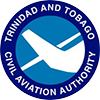The Aviation Security and Facilitation (AVSEC-FAL) Department is the section within the Trinidad and Tobago Civil Aviation Authority (TTCAA) with responsibility for the management, administration and implementation of Trinidad and Tobago’s Civil Aviation Security Oversight System, which includes inter alia, the monitoring and enforcing of all civil aviation laws, and policies and procedures as set out in the National Civil Aviation Security Programme. The Civil Aviation Security Oversight System is in accordance with the eight critical elements contained in Part C of the ICAO Oversight Manual Doc 9734.
Objective of Aviation Security
The primary objective of aviation security is to ensure the protection and safety of passengers, crew, ground personnel, the general public, aircraft and facilities of an airport serving civil aviation against acts of unlawful interference. This accomplished primarily through the Trinidad and Tobago Civil Aviation [(No.8) Aviation Security] Regulations 2004 and the security-related provisions in other Civil Aviation Regulations, the National Civil Aviation Security Programme; and audits, inspections, tests and surveys. Other pieces of legislation such as the Civil Aviation Act 2001, the Civil Aviation (Tokyo Convention) Act 1985, the Hijacking Act 1978, the Airports Authority Act 1979 and the Anti-Terrorism Act 2005 constitute the legislative framework for safeguarding civil aviation against acts of unlawful interference.
Roles and Responsibilities of the Aviation Security and Facilitation Department
In order to achieve the primary objective of safeguarding passengers, crew and aircraft against unlawful acts, the TTCAA AVSEC-FAL Department, which consists of a team of technically skilled and qualified Aviation Security Inspectors, including certified ICAO USAP-CMA Auditors and Security Instructors, use the legislative framework to guide its functions and responsibilities. The AVSEC-FAL Department’s functions include but are not limited to the following:
-
Developing, implementing and maintaining the National Civil Aviation Security Programme (NCASP);
Defining and allocating tasks and coordinating activities between government departments and agencies, aircraft and airport operators, air traffic service providers and other entities concerned with or responsible for implementation of the NCASP;
Keeping under constant review the level of threat to civil aviation within Trinidad and Tobago;
Approving persons, processes, security equipment and programmes in accordance with established civil aviation laws;
Conducting security audits, inspections, tests and surveys to ensure compliance with the NCASP and to validate the effectiveness of security measures;
Providing technical guidance to operators relative to the implementation of aviation security measures, procedures and processes; and
Collaborating with other ICAO Member States in the development and exchange of information concerning international civil aviation as appropriate
